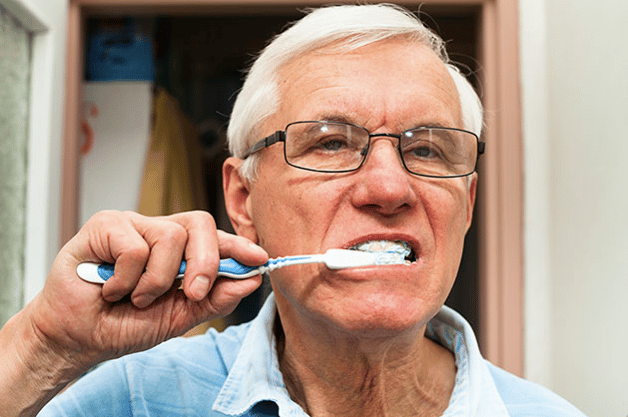
There are entire lists of recommendations, best practices, and professional suggestions we can discuss when it comes to maintaining oral health. When it comes to seniors’ health, dental health is particularly important for several reasons. Why?
Seniors’ teeth require special attention
As we get older, we learn to be pragmatic about new challenges and limitations that come with aging. Like many other areas of health and welfare, as we get older, oral health becomes more and more challenging to maintain.
That means it requires even more vigilance for the average senior to protect their gums and teeth from the same problems all of us face.
How aging affects our oral health
"It requires even more vigilance for the average senior to protect their gums and teeth from the same problems all of us face."
While diet and standard oral hygiene self care habits play a large role in how healthy and strong our teeth and gums can be, there’s an important genetic component as well. And for older genes, they have had more time to produce their effects. In addition, the prevalence of other health conditions common in old age can have an impact on oral health as well. As oral health concerns arise, there are simple ways to find affordable dental care for seniors.
Here are some common examples of how aging affects oral health:
- Receding gums - It’s very common for gum tissue to recede as we age, for much the same reason that skin tissue loses elasticity and begins to wrinkle. This recession of the gums exposes more of the root material of our teeth, making cavities and root-related infections more easy to develop in the senior population.
- Dry mouth (xerostomia) - Chronic dry mouth is a common side effect of taking certain prescription medications, which many older adults must do. It can also be a symptom of such common conditions as diabetes, Alzheimer’s disease, and Parkinson’s disease. This chronic lack of moisture in the mouth makes cavities, cracked lips, and fissured tongue much more likely in seniors.
- Impeded manual dexterity - As we age, various conditions, including arthritis, or simply weakness or a lack of coordination, can make it increasingly difficult to use our hands and arms as we used to. Two practices that often suffer as a result of this lack of manual dexterity is daily toothbrushing and flossing, both of which are vital to good oral health.
- Cognitive or memory loss - Alzheimer’s and similar conditions are certainly the most well-known, but various forms of dementia and memory issues can affect seniors for a variety of reasons. Along with so many other aspects of daily life, oral health can often be neglected as this occurs.
What you can do to combat age-related oral health concerns

Maintaining good oral health requires all the same routine self care practices we’re all familiar with:
- Brushing twice a day
- Flossing every day
- Seeing the dentist at least twice a year
But, as noted above, many challenges seniors face can make these seemingly simple efforts difficult or impossible. As a result, it’s important to find solutions to ensure we’re able to maintain our oral health over the long term.
For example, enlisting the help of friends and family can go a long way. If you’re caring for an older person, make a point of helping them remember to brush and floss daily. Make sure their biannual dental visit is scheduled well in advance, and that they have transportation to and from the appointment. If you’re a senior yourself, adhere closely to a calendar, and share your schedule with family or friends who can help coordinate with you and remind you of upcoming appointments.
If a manual toothbrush is no longer practical because of problems with weakness or coordination, many seniors have found that electric toothbrushes are easier to use to clean their teeth. Likewise, flossing alternatives like picks, brushes, and floss holders can make flossing easier for those who struggle with using their hands.
More regular dental visits may also be required if oral health concerns are appearing regularly. This will allow the dentist to inspect teeth more often and stay on top of developing conditions before they progress.
Whether you’re a senior looking for ways to pay for dental services, or you’re helping a loved one find affordable dental care for seniors, consider purchasing a dental discount card to maintain oral health without cost being a hindrance.

